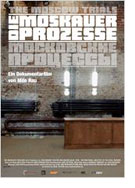

Opening 20 Mar 2014
Directed by:
Milo Rau
Writing credits:
This documentary is full of references to historical events, so that it helps to know the background for better understanding. In the Moscow Sacharow Center a controversial art exhibit opened on January 14, 2003. It was called Vorsicht: Religion (Beware: Religion). Four days later militant, orthodox Christians, protesting the exhibit, stormed the center and destroyed the art work, as well as Christian icons. Then, March 7-31, 2007, a new exhibit showed 24 works of art which had been forbidden in the previous years. Also showing at the Sacharow Center, this time one had to climb a ladder and look through a hole in the wall to see the paintings, drawings, etc. This exhibit, called Verbotene Kunst (Forbidden Art) was also closed down. There is a book with the same title, which shows this artwork, available for anyone to buy. On February 21, 2012, members of the band Pussy Riot smuggled a guitar into the Moscow Cathedral of Christ the Saviour. They were protesting the interaction between Putin and the officials of the Russian Orthodox Church shortly before Putin’s election. They were shut down within a few hours, but were able to make a video of the “performance” which circulated. All three of these events, occurring over nine years, went to court. In the case of Vorsicht: Religion, one witness said that he only needed 60 seconds to feel insulted by the artwork on display. In the case of Pussy Riot two girls were sentenced to several years in a prison work camp. One supporter of the art was Anna Altshuk, a poet and demonstrator who was found dead in Berlin, cause of death still unknown.
Thus you have a thumbnail version of three protests of Russian citizens against fascists, the Russian Orthodox Church, the government, etc. They were demonstrating for freedom of speech, as well as their concept of religion and democracy.
Now, March 1-3, 2013, we have another work of art in the form of a film. Director Milo Rau has collected actors, artists, journalists, curators, professors, lawyers, to join the cast to perform a play. It also takes place in the Sacharow Center in Moscow, and the stage is set up to look like a court room. There is a female judge; there are seven members of the jury representing all walks of life: old and young, male and female, Christian and Muslim, entrepreneurs and apprentices. Over a three-day period they re-enact the three court cases which arose from the three events. “Lawyers” acting as defenders and prosecutors question the “witnesses” about their actions. In this way they expose the real or imagined intentions behind the events. Each side has the opportunity to explain their take on the problem.
As a result the problems of a non-flexible government are laid bare. There is a disregard for individual religious beliefs and feelings. There is no real separation of church and state. They throw around words like “Jewish,” “Russian identity,” “prostitutes,” “Neo-nazis,” etc. Although we naturally know which side the actors are on, still the “play” does a good and fair job of communicating both sides of the picture. How would we react if five skimpily clad young women with hoods over their faces caused a ruckus on the altar of the Johannis Kirche in Hamburg? Someone would call the police, and they would be thrown out and arrested for disturbance of the peace. There would be no political repercussions, nor prison sentences, but a fine would have to be paid, I am sure. In this film, at the end of the three days of re-enactment, there is a hung jury.
The film was in Russian with some German and English and German subtitles. Actually, it is quite amazingly full of contradictory opinions. It never seems to be a drama on stage, but real life. Perhaps the greatest benefit of watching this interesting film is to introduce events which happened in Russia, a country which seems far away, but closely interacts with Germany, from selling us gas to hosting our athletes at the Olympics. We are in a situation to have an open mind and can research at will. We should not take this for granted. We must always be aware. (Becky Tan)